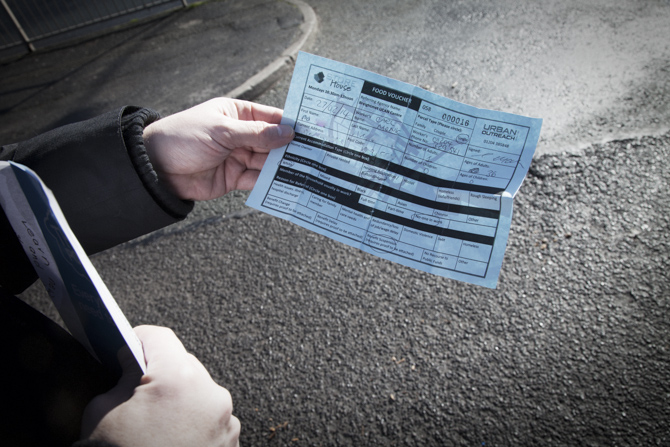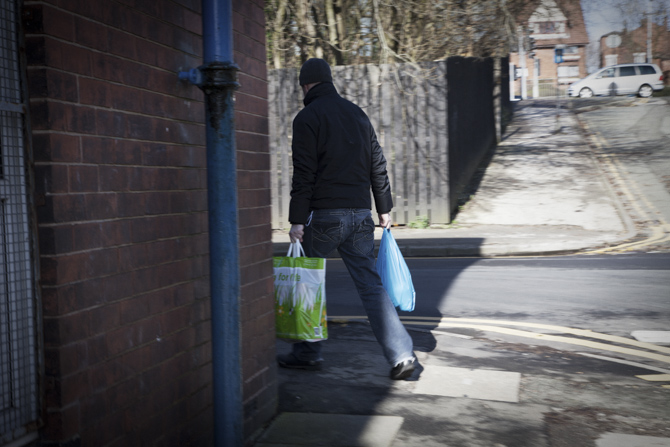The most generous
… continued from A trip to the food bank
“How would you normally get there?” I ask in the car after Lee has accepted my offer of a lift.
“I’d walk. I’ve no money for bus fares. It’s only about half an hour, a bit more on the way back, uphill with the bags. Last time they offered me bus fare for the way home.”
“Have you got any income at all?”
“Nothing,” he says. “I applied for Local Welfare Provision and managed to get £50 in vouchers for both gas and electric that has to last until the beginning of May.”
“What happens if it runs out before then?” I ask. Lee shrugs.
Local Welfare Provision is a limited government fund administered by the local council and available to those facing ‘exceptional financial difficulties’.
It’s intended as a stop gap and people can make up to two applications in any one year. Applying for the payment, I’ve been told, is not easy. It’s either a lengthy telephone conversation or an online application, and neither, for many applicants, is straightforward.
“Where here?”
“Take a right and then left at the lights. I’ve been to the Citizens Advice about making an appeal against the decision to sanction me,” he says. “They can also help me make a claim for a hardship payment.”
If successful Lee could, at best, get his sanctions overturned or at least get hardship payments to see him through. The payments are a percentage of his Jobseekers’ Allowance. He might get about £29 a week to live off.
“Do you have any family or friends who could help?” I ask.
“They’re all in the same situation,” he says, “No one’s got anything to spare.”
The Store House food bank, run by the Urban Outreach Christian charity looks busy enough although we don’t even get through the front door. One of the volunteers, stationed in the porch, checks Lee’s voucher but points out he should have brought his DWP [Department of Work and Pensions] letter, confirming his sanctions. No letter, no parcel.
“Come on, we can be up to your place and back in no time.” I say.
He’s embarrassed, he thinks he’s wasted my time. For me, it’s all part of the story and our refusal counters some of the criticism leveled at food banks that they are an easy touch, handing out food to anyone who wants it. Recipients have to be referred by one of the frontline agencies working closely with them and even then the blue voucher isn’t a magic ticket, documentation is often required to back it up.
Within half an hour we are back and the volunteers are apologetic. “No problem,” I say. “We totally understand.”
Inside volunteers signpost their customers to other Urban Outreach services as they drink tea and tuck into apple turnovers and raisin whirls, leftovers donated by the local Sainsbury’s.
Lee and I sit with Gaynor, one of the organisers, and I ask where their donations come from. The food, she says, comes from a number of different sources. Fareshare, the nationwide chain, provides outdated or wrongly labelled supermarket food that might otherwise be binned.
The charity’s own network of ‘Grub Tubs’ collect tins and non-perishable donations from the public. “There’s one at the UCAN, isn’t there? I’ve always thought that was a bit ironic.”
Gaynor smiles. “Those who have least are often the most generous,” she says.
There is so much talk of food banks right now. Some politicians are unwilling to acknowledge that their recent rise has anything to do with welfare reform changes. But, whatever the politics, it is clear that Gaynor and her colleagues are offering a vital safety net for those who have fallen the furthest.
Back at the UCAN, I recount my morning’s experiences and both Vanessa and Carl agree, there are lots of Lees around just now: individuals and families where every single pound is crucial in surviving the week.
And, they say, the Jobcentres are getting tougher. Claimants are being sanctioned for the smallest of misdemeanors. A missed appointment can result in a reduction in benefits that are already inadequate to meet basic food and fuel costs.
Lee is on my mind as I drive home. I think about all the things he won’t be able to do this week or next, or maybe for a few weeks yet.
It’s Monday and so it’s ‘spag bol’ for dinner. I cut up onions, peppers and chillis, and contemplate what Lee might be preparing for his meal tonight.


